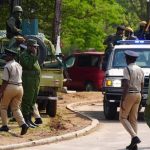By Thandiwe Ketis Ngoma
I watched the response that Vice President W.K. Mutale Nalumango gave in Parliament yesterday, on November 1, 2024, during question time, where she shifted blame to the police for the unlawful and prolonged detentions of citizens without bail. I listened with great sadness. Her assertions that the President remains uninformed about the police’s actions lack credibility and reveal a troubling disregard for the Zambian people’s intelligence.
The buck unequivocally stops with President Hakainde Hichilema. The attempt by Madam Nalumango to absolve the President of responsibility by suggesting he has no control over police actions is an affront to the principles of leadership and accountability. The Inspector General of Police, like all other law enforcement officials, operates under the explicit directives of the Commander-in-Chief. Every action taken by the police ultimately reflects the President’s authority and approval—or his failure to curb overreach.
In recent weeks, Zambians have witnessed a disturbing escalation of police abuse, with unchecked aggression targeting opposition leaders, religious gatherings, and ordinary citizens. These are not isolated incidents. They form a clear pattern of intimidation and suppression aimed at silencing dissent and creating an atmosphere of fear. If President Hichilema truly disapproved of these heavy-handed tactics, we would see decisive action from him. Instead, his silence is deafening, his inaction speaks volumes, and his failure to rein in these abuses is a betrayal of the democratic principles on which he campaigned.
The reality is stark: the Inspector General of Police cannot and would not override the President’s directives. If President Hichilema genuinely opposed the excessive force, unlawful detentions, and suppression of fundamental freedoms that we are witnessing, he would have removed the Inspector General for gross incompetence or complicity by now. His failure to do so sends a clear message that these abuses enjoy the blessing of the highest office in the land.
The consequences of this inaction are devastating for Zambian democracy. Citizens now live under a cloud of fear, where speaking out could mean harassment, detention, or worse. Religious institutions, once sanctuaries of peace and conscience, are disrupted by police forces acting with unchecked authority. Political opposition faces mounting restrictions, deprived of basic rights to assembly. This is not the Zambia that the people envisioned, and it is not the Zambia they were promised.
The absence of accountability in this administration threatens to erode the foundations of our democracy. By failing to hold the police leadership accountable, the President is endorsing a dangerous trend toward authoritarianism that will be hard to reverse. Zambians deserve a leader who will stand by their constitutional rights, not one who stands by as those rights are trampled. It is time for President Hichilema to act—or admit that his administration has chosen control over liberty and fear over freedom.




